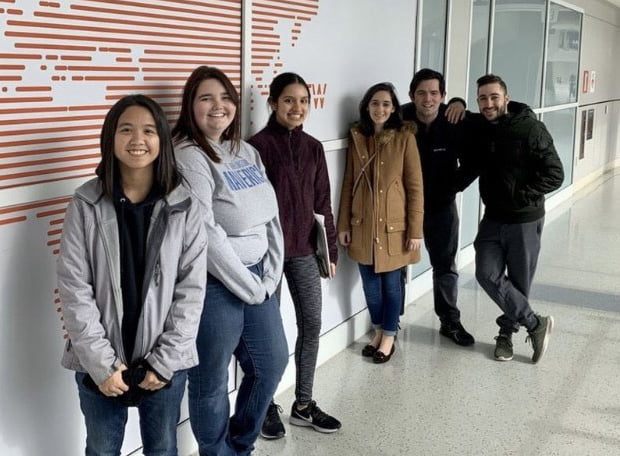Helping wheelchair-using air travelers

A team of engineering and social work students from The University of Texas at Arlington is designing a new app that would allow older, wheelchair-users to schedule someone to meet them at the airport curb with a wheelchair, escort them through the building and drop them off at their terminal.
The students hope that, when complete, the app will work like the popular rideshare app Uber, with a traveler downloading it and scheduling a pickup at any of the nation’s airports.
Joanna Glover, a graduate research assistant in the School of Social Work, said her 69-year-old grandmother came to mind when she joined the project. If Glover could make air travel experiences less stressful for her, then her work with the team would have been worth the investment.
“I really hope it’s something she can eventually use,” Glover said. “That would really give me a sense of pride.”
The app, named WheelTrip, is being designed by students from the College of Engineering. Glover, whose research focus in the School of Social Work is on aging, is the lone team member from an alternate discipline.
The other team members are Nikolai Drigalenko, the team’s captain and a Master’s student in the Industrial, Manufacturing and Systems Engineering Department; Shannon Abolmaali and Isabella Reyna from the Industrial, Manufacturing and Systems Engineering Department; Justine Batongmalaki from the Computer Science and Engineering Department; and Elio Salloum from the Civil Engineering Department
“We chose a project that focused on passengers who use or need wheelchairs because there’s a need for better access, but also because it was a chance for us to stand out with a project that can really have an immediate impact for travelers,” Drigalenko said.
The team is working with faculty advisor Jay Rosenberger and industry mentors Gloria Bender, Managing Principal at TranSolutions, an aviation operations consulting company, and Willie Hernandez, founder of Per4Max, which makes wheelchairs for active disabled individuals.
“I’m proud of this team. They’ve really embraced the idea of multi-disciplinary collaboration, and they’ve been all-in on this competition since the beginning,” said Rosenberger, a professor in the Industrial, Manufacturing and Systems Engineering Department. “They’ve really shown great maturity and approached the problem seriously, and this result shows that their hard work has paid off.”
While the WheelTrip app still is under construction, it is already drawing attention.
In early March, the Federal Aviation Administration alerted the UTA team that it is among three finalists in the FAA Challenge: Smart Airport Student Competition. The FAA sponsors the national competition to encourage college students to use technology in designing solutions to airport travel issues.
The competition’s top team will win $25,000. Purdue University and the University of North Dakota round out the remaining finalists.
--Written by Valerie Hill, UTA School of Social Work